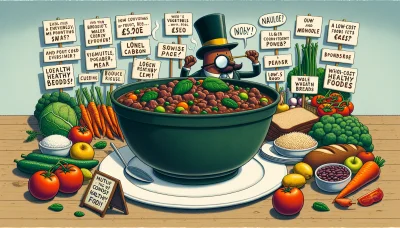Regular Weekly Menu Planning Quiz
Test Your Knowledge
Question of
The Benefits of Regular Weekly Menu Planning
Menu planning on a weekly basis is a cornerstone habit for anyone looking to embrace healthy eating and maintain a balanced diet. It allows individuals to thoughtfully select a variety of meals ahead of time, ensuring that each dish contributes to their nutritional needs without the last-minute stress of deciding what to eat. By planning meals in advance, people can better manage portion sizes, incorporate a wide range of fruits and vegetables, and avoid the pitfalls of impulsive or convenience food choices that are often high in calories but low in nutrients. Furthermore, weekly menu planning can help in reducing food waste and saving money, as it encourages the efficient use of ingredients and minimizes unnecessary purchases. Ultimately, dedicating time to plan your meals for the week is a proactive step towards achieving a healthier lifestyle and diet.
How to Start with Weekly Menu Planning
Beginning your journey with weekly menu planning starts with setting clear, achievable goals for healthy eating. First, assess your current dietary habits and identify areas for improvement, such as incorporating more fruits and vegetables or reducing processed food intake. Next, consider your schedule and how much time you can dedicate to meal preparation each day. With these insights, you can start outlining your weekly menu, ensuring to balance nutrition while accommodating your lifestyle. Remember, the key is consistency and flexibility, allowing room for adjustments based on your progress and feedback from your body.
Essential Tips for Effective Menu Planning
- Start by assessing what ingredients you already have to minimize waste and save money.
- Plan your meals around seasonal produce to ensure freshness and better nutrition.
- Incorporate a variety of colors in your meals to ensure a range of nutrients.
- Batch cook and prep ingredients ahead of time to make weeknight dinners easier.
- Include at least one protein, a complex carbohydrate, and healthy fats in each meal for balanced nutrition.
- Plan for leftovers to save time and energy on cooking every day.
- Make a grocery list based on your meal plan to avoid impulse buys and stick to your health goals.
- Consider theme nights, like “Meatless Monday†or “Taco Tuesday†to simplify decision-making.
- Use online resources and apps to find new recipes that fit your nutritional goals and taste preferences.
- Listen to your body’s hunger and fullness cues to determine portion sizes and avoid overeating.
Sample Healthy Weekly Menu
| Day | Breakfast | Lunch | Dinner |
|---|---|---|---|
| Monday | Oatmeal with fresh berries and almonds | Grilled chicken salad with mixed greens | Salmon with quinoa and steamed broccoli |
| Tuesday | Green smoothie with spinach, banana, and protein powder | Vegetable stir-fry with brown rice | Beef stir-fry with vegetables and a side of whole grain pasta |
| Wednesday | Whole grain toast with avocado and poached eggs | Lentil soup with a side of whole grain bread | Grilled shrimp with mixed vegetables and farro |
| Thursday | Greek yogurt with granola and honey | Turkey and avocado wrap with a side of carrot sticks | Chicken curry with brown rice |
| Friday | Scrambled eggs with spinach and feta cheese | Quinoa salad with black beans, corn, and avocado | Grilled steak with sweet potatoes and asparagus |
| Saturday | Pancakes made with almond flour, topped with fresh fruit | Chicken Caesar salad | Vegetable lasagna with a side salad |
| Sunday | Chia pudding with mixed berries and nuts | Grilled vegetable and hummus wrap | Roast chicken with roasted root vegetables |
Incorporating Seasonal Produce into Your Menu
Using seasonal fruits and vegetables in your weekly menu planning offers a myriad of benefits that extend beyond just the taste. Firstly, seasonal produce is at its peak in both flavor and nutrition. When fruits and vegetables are grown and harvested in their appropriate season, they naturally develop all the right qualities we love - richer flavors, vibrant colors, and optimal nutritional content. Moreover, incorporating seasonal produce into your diet encourages a diverse range of foods throughout the year, ensuring you receive a variety of nutrients and benefits from your diet. Additionally, seasonal produce often comes from local sources, reducing the environmental impact associated with long-distance transportation and supporting the local economy. By choosing seasonal items, you're not only enjoying the best of what nature offers at any given time but also contributing to a more sustainable and health-conscious lifestyle.
Tools and Apps to Simplify Your Menu Planning
With the hustle and bustle of daily life, organizing and planning your weekly meals can sometimes feel like a daunting task. Fortunately, technology is here to make our lives easier. A variety of tools and apps have been developed to assist in menu planning, ensuring that you can save time, reduce food waste, and even stick to your dietary goals with ease. Popular options include meal planning apps that offer recipe suggestions based on your preferences and dietary restrictions, grocery shopping apps that help you keep track of what you need to buy, and even apps that can schedule your meal prep for the week. By leveraging these digital assistants, you can streamline your meal planning process and enjoy more time doing the things you love.
Overcoming Challenges in Weekly Menu Planning
Many individuals find weekly menu planning to be a daunting task due to common obstacles such as lack of time, limited cooking skills, and the struggle to maintain variety in their meals. One effective strategy to overcome these challenges is to set aside a specific time each week dedicated to meal planning and preparation. This can help streamline the process and reduce the feeling of being overwhelmed. Additionally, leveraging online resources and cooking apps can provide inspiration and tutorials to enhance cooking skills and introduce new and exciting dishes to your menu. Another useful approach is to create a meal plan rotation that includes a mix of favorite recipes and new dishes to keep meals interesting while minimizing the decision-making process. By implementing these strategies, individuals can navigate the challenges of weekly menu planning more efficiently, leading to a more enjoyable and stress-free cooking experience.












